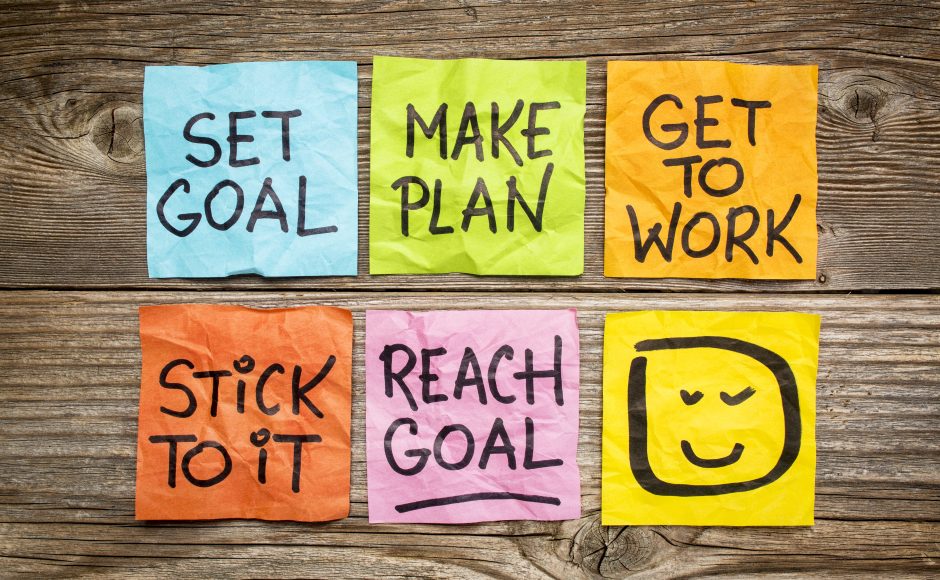New Year, new you…if you follow the tradition of making resolutions the pressure may be on in the first few months of the year to set a target or goal for self-improvement.
In fact, much of the population may be looking for a fresh start in 2022 after two years of pandemic related stress.
Despite the potential for more Covid-variant disruptions and uncertainty, making resolutions based on successful goal setting principles could help deliver a much-needed psychological boost.
According to psychological goal setting theory (Locke, 1996), working towards meaningful goals can provide a sense of direction, purpose and meaning in life.
If goals are set with healthy boundaries, the process can help build self-confidence, autonomy and happiness. Setting goals can be good for mental health and life satisfaction.
What is Goal Setting
Goal setting is the process of planning, organising, and implementing a course of action to achieve a personal or professional objective. It’s an effective way to increase motivation and create the changes you want to see in your life.
From a psychological perspective, goals play a dominant role in shaping the way we see ourselves and others. A person who is focused and goal-oriented is likely to have a more positive approach towards life and perceive failures as temporary setbacks, rather than personal shortcomings.
In its simplest form, successful goal setting involves:
- Working out what you want to change or achieve
- Working out why you want to change or achieve it, as a source of motivation
- Making and following a plan of action
How to Set Achievable Goals
Despite best intentions, many who make resolutions without the right framework will likely abandon their goals before the end of January. One study in the United States reported that 92% of New Year’s resolutions failed by January 15.
Conversely, targets incorporating the principles of goal setting theory typically yielded a 90% success rate.
To achieve success when setting goals, psychologists recommend using a SMART-ER framework. While the SMART acronym may be well known, psychological researchers have added ER to the rule.
Use a SMART-ER Framework for Success
Smart goals stand for:
- Specific. Goals should be well defined and target a specific area for change or improvement. What will be accomplished? What actions will you take?
- Measurable. Goals should have a clear measure of success that can be quantified or indicate progress
- Achievable. This focuses on how important a goal is to you and what you can do to make it attainable and may require developing new skills and changing attitudes. The goal is meant to inspire motivation.
- Realistic. Goals that are practical and planned in a way that would be easy to implement in real life. The purpose of a smart goal is not just providing the plan, but also helping you to execute it.
- Time Bound. This involves setting a time frame for accomplishing the goal.
- Evaluative/ethical. The goal and its execution follow your personal values or professional ethics
- Rewarding. The end-result of goal setting comes with a positive reward and brings a feeling of accomplishment.
Secret to Achieving Goals
Research carried out at London’s Queen Mary University in 2020 discovered one secret in achieving goals.
The study analysed the relationship between reward and effort in achieving goals and identified two critical stages in the decision-making process.
Researchers found that when people first decided what to do, they were motivated by rewards. However, once they began to put plans into action, their focus turned to the difficulty of the effort they needed to put in.
The researchers suggest that the key to achievable goals is to consider the effort needed when deciding what to do, and then remembering to focus on the rewards once the time comes to put the effort in.
As an example, putting this into practice may mean writing a list of benefits of your chosen goal and re-reading it if your motivation starts to wane.
Setting micro goals, or smaller milestones on the way to achieving your large goal can also assist in achieving success.
How to Set Goals
You can set small, short-term goals or long-term life goals.
It may be tempting to set a lot of goals at once, but if you do, you’ll likely be overwhelmed. Start small and build your goals up as you work towards achieving them. Set a few initial goals, then revisit your progress regularly.
Here’s a brief video about goal setting (6:06):
How Cognitive Behaviour Therapy Can Boost Goal Setting Success
Psychologists often use cognitive restructuring to help clients transform negative thought patterns to help achieve goals.
Cognitive Behaviour Therapy can be used to encourage people to identify and challenge negative thoughts and replace them with more positive thoughts. Through changing negative thought patterns, an individual is more likely to have success when it comes to goal setting.
Reframing goals into positive terms will also increase your likelihood of staying motivated.
For example, if you have an all-or-nothing mentality when you slip-up causing you to want to abandon your goal, CBT can assist to reframe your thinking to maintain realistic expectations instead of feeling discouraged.
Get Help with Goal Setting
If you need help with goal setting, consider consulting a psychologist who can assist with CBT and guide you to achieve a positive change in 2022.
If you want to know more, please email or call our friendly admin staff. We’re happy to answer any questions you may have and talk about whether we can assist you. Contact us today.
 Blog
Blog 
